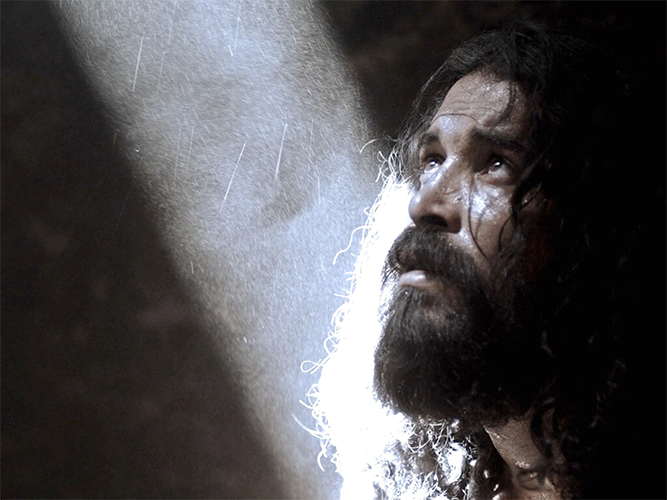Perhaps you’ve heard of discouragement.

Jesus’ ministry is going well. Word of His doings has reached the ears of the prisoner known as John the Baptizer.
The Question and the Questioner
John is locked up, but he still has his followers; people he can beckon and send, who will do whatever he asks them to. He commissions two of them to find Jesus and ask Him: “Are You the Coming One, or do we look for another?” (Matt. 11:3).*
The question sounds fair enough, doesn’t it? Like an ordinary query in order to substantiate a fact, to distinguish it from rumor. It may sound that way, but it’s no ordinary or casual question. It’s a shocking question, based on whom it’s coming from.
Having searched my mind for a question in today’s setting that would help illustrate how unsettling this query was, I concluded: it is as if your adult son, now in prison on some trumped-up charge, has sent to ask you: “Are you my real mother, or should I do some more ancestry searching?” Your intelligent, solid-thinking, balanced, confident son has sent to ask you: “Are you my real mother?”
That would be unsettling—to say the least. It would make you question the state of your son’s mind, wouldn’t it? It would cause you to wonder what the wardens were doing to him in that institution, or what the experience has done to his thinking.
Who is this John the Baptizer who sends to ask Jesus, “Are you the coming Redeemer?”
Explaining a little about John may help one grasp how unsettling his question is. John’s story is literally out of this world. A priest named Zacharias, and his wife, Elizabeth, cannot have children—all the apparatus that would have made it possible for them to become mother and father has passed the “sell-by” date (Luke 1:7). But then God sends an angel to tell the priest of a miracle God is about to do. The old priest starts to give the angel a biology lecture, telling this holy being why his proposal didn’t make sense (see verse 18). The angel then gives the priest proof that silences all argument: he strikes him dumb (see verses 19, 20). So Zacharias now knows that this matter really is out of this world.
John’s miraculous birth story is only half of John’s story. Once he’s miraculously conceived, born, and matured, he launches into a career that is just as out of this world: his job is to prepare the way for the world’s Redeemer. John goes out announcing that the hope of all humanity, the Son of God, is coming to take away all our problems and to establish God’s perfect kingdom. Everybody is to repent and get ready to join the out-of-this-world kingdom that’s coming to this world. John’s job title is forerunner of the King of the new kingdom. His job is to shout, “Prepare the way of the Lord; make His paths straight” (Luke 3:4).
When the King arrives, John points Him out to the public (John 1:29, 36). He also participates in His inauguration as Messiah, God’s anointed Savior of humanity (Matt. 3:13-17).
Saying all this about John makes his question about Jesus doubly troubling. It’s worse than a son doubting his mother; it’s the other way round. John identifies Jesus; prepares the road for Him. He brings Him into the spotlight and participates in His anointing. It’s like you, as a mother, asking if the child you carried for nine months and fed and clothed for 21 years is actually your son. What could produce such confusion in John’s head?
How the Confusion Happened
The answer is a single word: “discouragement.”
Discouragement is one of Satan’s most deadly weapons against those who serve God. I have seen people who would rather die than break one of God’s commandments brought down by discouragement. You may have seen how it drains a faithful soul suffering through a long, lingering, strength-sapping illness—whether their own or that of a loved one whom they are caring for to the bitter end. It comes through the death of a child. It works through a constantly irritating spouse, or an unbearable nagging boss, or by a million means besides.
Discouragement clouds our judgement and turns God’s warrior from apostasy-slayer to coward hiding in a cave—as per Elijah fleeing in fright of a woman’s words (1 Kings 18, 19). Discouragement doesn’t need to get us into overt sin. Satan wins by simply dragging the conscientious follower through physical pain and mental anguish to a place where the logic no longer matches up; where God’s promises no longer seem to add up; a place where doubt takes hold and faith is on the run.
How Do You Answer Discouragement?
How does Jesus answer John’s servants who come asking if He’s really the one John said He would be? “Go and tell John the things which you hear and see: The blind see and the lame walk; the lepers are cleansed and the deaf hear; the dead are raised up and the poor have the gospel preached to them” (Matt. 11:4, 5).
John’s followers must tell him what they have seen. Jesus’ message says what needs to be said to God’s mighty messengers who end up in ugly, unjust, and wretched circumstances, like John rotting away in Herod’s dungeon. Jesus’ broken-bodied, mind-boggled servants can hear His message: Locked away? Unable to move? To thunder against evil? To stir the multitudes to fear and repentance? God, my child, is still busy. His work is going forward. He values you for both yourself and as part of something much bigger.
Jesus fulfilled all of John’s predictions. Prison is no comfort suite, but foul Herod and his vile wife could not silence John by imprisoning him. John’s work was to be God’s stentorian announcer of God’s Messiah. Every act of Jesus is a fulfillment of John’s voice and work. Because of John we know what’s coming next. His words—from Isaiah—are about to become a universal spiritual and physical reality: “Every valley shall be filled and every mountain and hill brought low;the crooked places shall be made straight and the rough ways smooth; and all flesh shall see the salvation of God” (Luke 3:5, 6; also see Isa. 40:4, 5).
John lost his head in prison. It didn’t take away one shred of his success. His work was to prepare the way for Jesus. He did. Now, thanks to John’s work and despite his despair, we are crowned forever with the blessings from the Messiah—and waiting for even more.
*All Bible texts are from the New King James Version. Copyright © 1979, 1980, 1982 by Thomas Nelson, Inc. Used by permission. All rights reserved.








